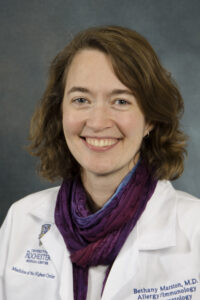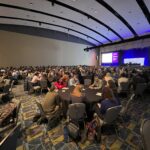As both an adult and pediatric rheumatologist, Bethany A. Marston, MD, holds dual appointments as associate professor in the Departments of Pediatrics and Medicine at the University of Rochester, N.Y. Her experience in multiple types of clinical settings will help guide her in her new role as chair of the ACR’s Committee on Rheumatology Training & Workforce Issues (COTW).
Future of Workforce Issues

Dr. Marston
When thinking about her career path, Dr. Marston grappled with the traditional divide between adult and pediatric care. “I have always felt that life stages are much more complex than ‘pediatric vs. adult.’ Choosing one over the other seemed arbitrary to me,” she says.
“Caring for the entire age spectrum is helpful for understanding our patients’ lives and priorities,” Dr. Marston adds. “I chose rheumatology in part because it lends itself well to care of children and adults throughout the continuum and enables longitudinal therapeutic relationships with patients and families.”
Dr. Marston notes that the pandemic has caused huge changes in how and what many rheumatology trainees have learned in the last two years. Under her leadership, the COTW will be working with fellowship programs to “find our new normal, incorporating telemedicine, remote learning and recruitment” into training. Together, she hopes the committee will be able to address the changes wrought by the pandemic as well as educational needs for the future.
There is a lot of work ahead to understand current rheumatology workforce needs, Dr. Marston says, including the increasing role of advanced practice providers and workforce differences between pediatric and adult specialty availability. She applauds the ACR’s commitment to supporting education for a range of learner types through development and dissemination of electronic teaching tools. The COTW will have many opportunities to improve rheumatology practice in the coming years, she says.
Making Time for Volunteering
Encouraged by her mentor, Christopher T. Ritchlin, MD, MPH, Dr. Marston’s first volunteer role with the ACR was on the task force that writes items for the In-Training Examination. She later joined the COTW, moving into a co-chair position with Beth Jonas, MD, who is now the outgoing COTW chair.
In her three years as a member of COTW, Dr. Marston has worked on a range of projects, including a workforce study of medicine/pediatrics-trained rheumatologists, a telemedicine working group, writing for the Advanced Rheumatology Course and advising the relaunch of the Rheum2Learn 2.0 curriculum directed at resident learners. With funding from the Rheumatology Research Foundation Clinician Scholar Educator Award, she developed what is now the ACR’s Rheum4Science project, a self-directed curriculum authored by scientific experts and designed to give rheumatologists-in-training an understanding of the scientific principles underlying clinical practice and investigation. This online curriculum contains eight modules, with additional content still in development.
Involvement with professional volunteer projects entails dedicating unpaid time to the work, Dr. Marston acknowledges. Especially for those in academic medicine, she says there’s a real challenge involved with “figuring out which projects are underrecognized financially but may be valuable in other ways, and how to balance those activities against clinical responsibilities.”
Yet volunteer work is “rewarding in ways that a paid job isn’t,” she says. The work offers different opportunities to build relationships with colleagues, as well as chances for personal growth. She calls herself “a much better educator and better educational leader” because of the volunteer projects she’s worked on. Another factor in her motivation to volunteer: the desire “to leave something better than you found it.”
Gretchen Henkel is a health and medical journalist based in California.



